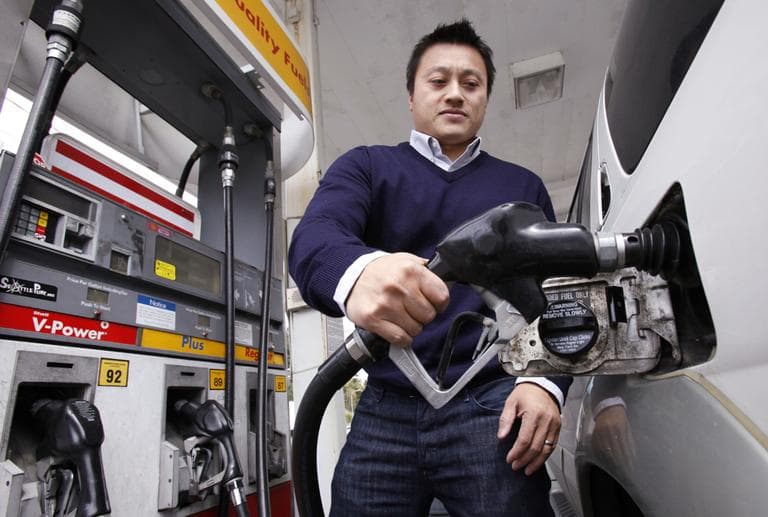Advertisement
As Gas Prices Rise, The Blame Game Continues

If you've spent any time driving recently, you can't help but have noticed the skyrocketing price of gas. AAA Southern New England said gas prices in Massachusetts have spiked 16 cents per gallon over the past week. Right now an average price for a gallon of regular unleaded gas in the Bay State is $3.82.
Of course, prices fluctuate from one station to the next. But driving on Route 9 this week, we were struck by just how wildly they're varying.
At a Gulf gas station on the highway running east in Brookline, regular unleaded gas was selling for $3.89 a gallon. About a half-mile away at a Mobil gas station, a gallon was selling for $4.09, a $.20 difference. Why?
"The general public blames people like us, the gas station owners, for gouging, and it's not us," said Carol Stein, owner of Chestnut Motors, the Gulf station selling the cheaper gas.
AAA Southern New England said gas prices in Massachusetts have spiked 16 cents per gallon over the past week.
Stein said customers see that range in prices and assume it's the stations doing the gouging. But she insists it's not them.
"It's the suppliers. They're selling it to every station at a different cost price. If you look at Gulf, they're on the Pike, it's a standard price on the Pike. But if you go to any other Gulf station, everybody has a different price, based on what their cost is," she said.
In other words, Gulf is selling its gas to Stein at one cost price and selling it to other stations at a different rate entirely. So she has no choice but to sell it at a slightly higher rate than the price she bought it at, regardless of what the other stations around her are charging for their gas — including other Gulf stations.
All the gas companies do this. So down the street, at that Mobil station where gas is $.20 more expensive, owner Elias Audy said he has to knowingly sell his gas for far more than the stations around him.
Advertisement
"Oil companies work with a theory called zone pricing: Each zone has a different price, and they pick and choose their zones, where they can charge more money and where they can not charge more money because they want to sell the gas eventually, they charge less," Audy said.
"Unfortunately, I'm in a zone where it's always high because it's the only Mobil station from downtown Boston to [Route] 128 and they feel they can charge anything they want, and at any given time my price is $.10 to $.15 cents higher than any other Mobil station — not just competitor — but any other Mobil station."
This range in prices leads the public to suspect that they're somehow being cheated. This past weekend, Massachusetts Attorney General Martha Coakley responded to that anxiety by warning gas stations that she's on the lookout for price gouging and will be monitoring stations for compliance with state gas laws.
Are the gas stations really blame-free, as the station owners claimed to us? Vahan Janjigian, chief investment officer at Greenwich Wealth Management in Connecticut, joined Morning Edition to answer that question.
"You can never know for sure exactly how much a gas station is making unless you do a complete audit on their books and know what they're paying for gas," Janjigian said. "However, I think it's safe to assume that for the most part you are not being gouged if you are buying gasoline in an area that is fairly populated, that has a large number of gas station in a one- or two-mile radius."
This program aired on April 27, 2011.